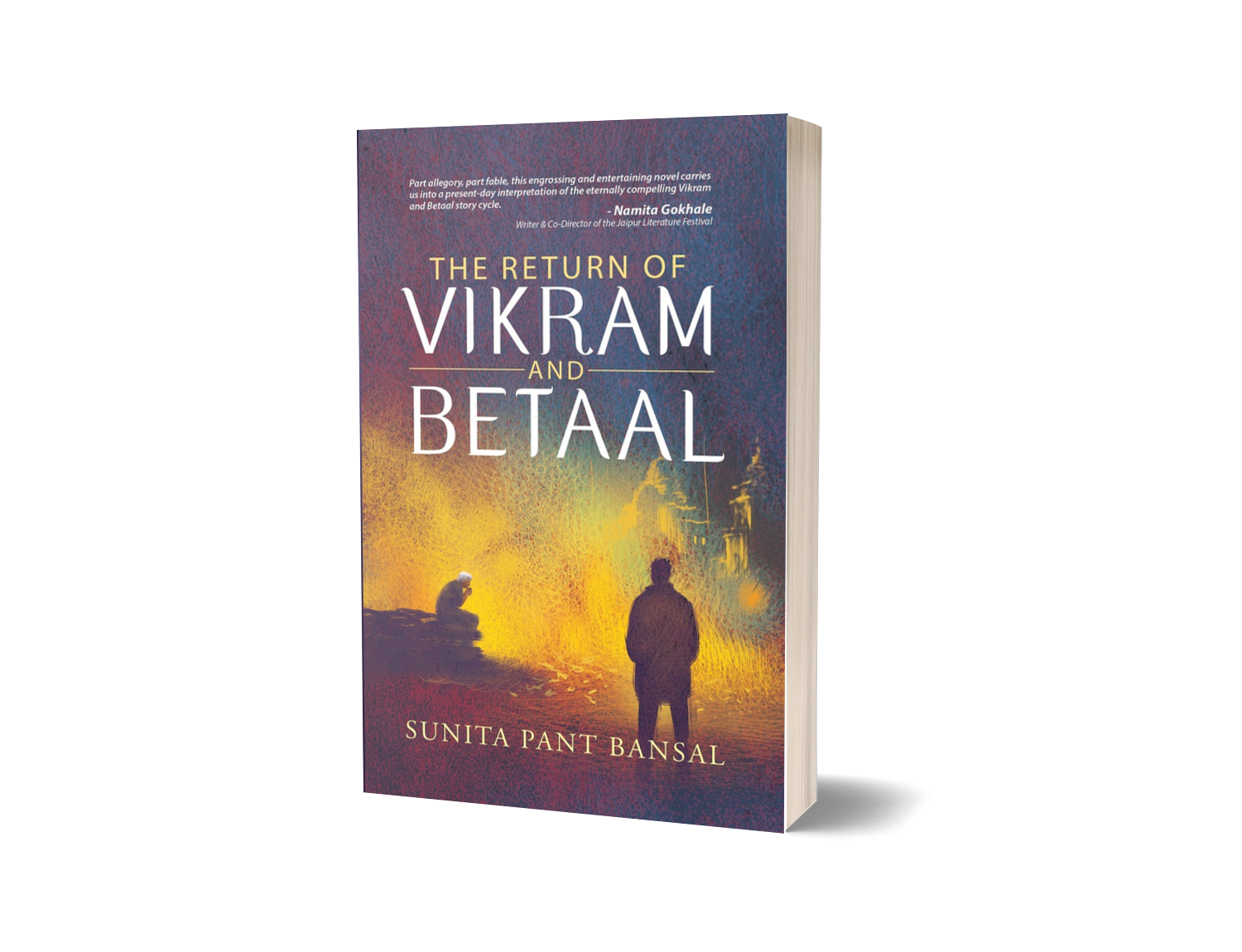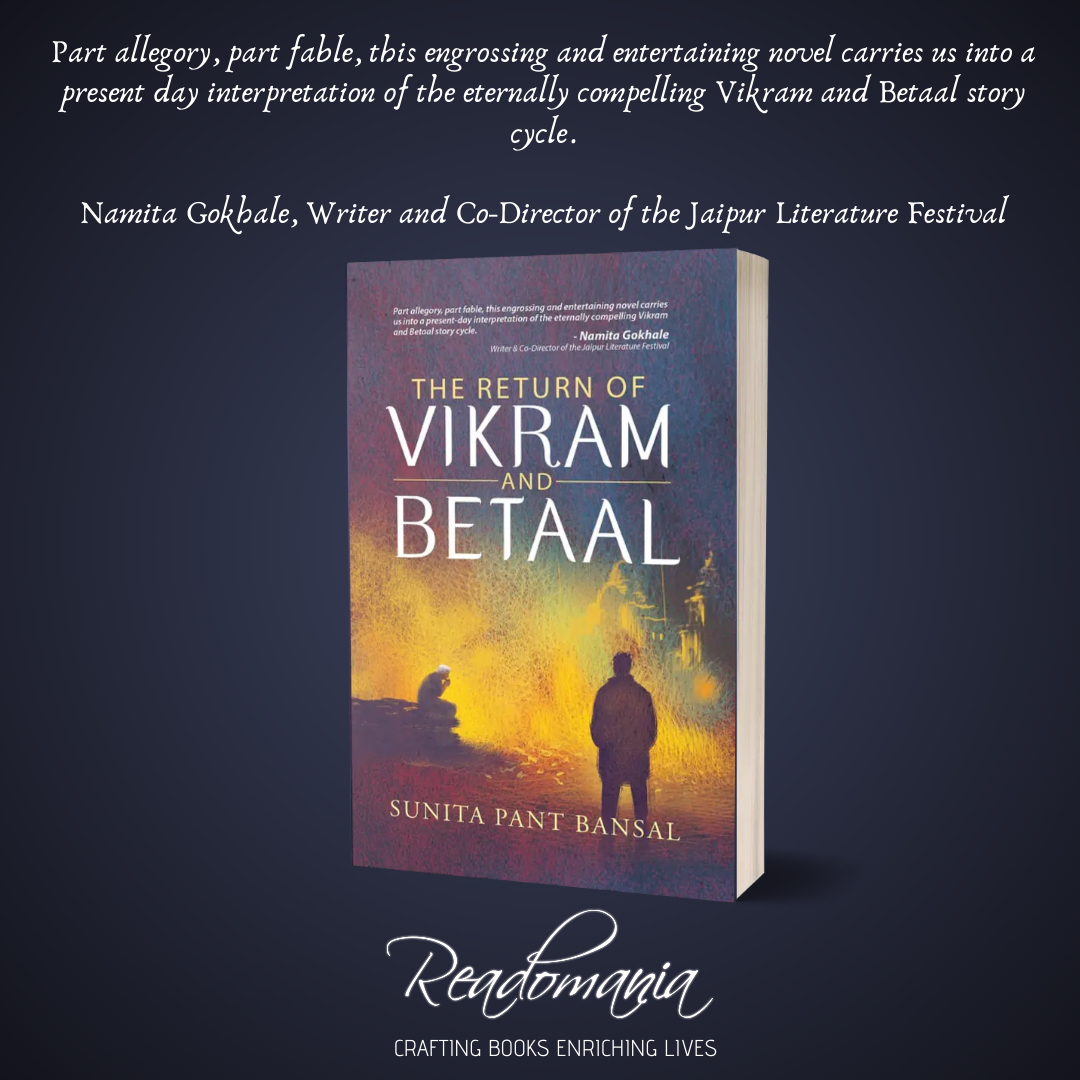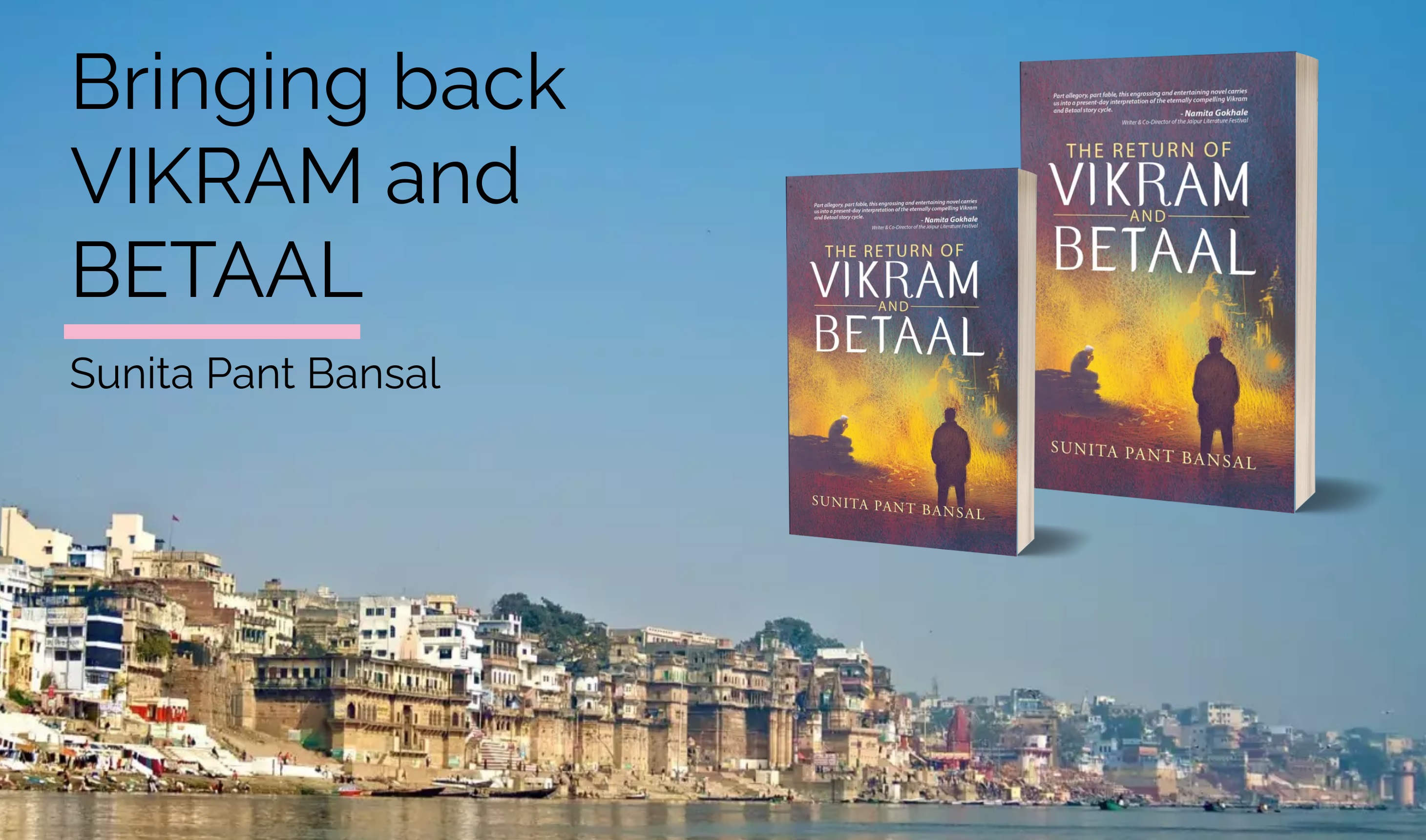Sunita Pant Bansal is a mythologist, a storyteller hailing from Kumaon hills of the Himalayas. Her forte is demystifying Hindu scriptures to show their relevance and application in today’s times. She explores and reinterprets the timelessness of characters from the epics and foundational texts in her stories, seamlessly blending mythology and history with real life.
Sunita has authored 25 books for adults and young adults decoding the philosophy of mythology and hundreds of books for children on folk literature and scriptures. Her books sell in multiple languages globally. Not limiting herself to books, Sunita has also dabbled in writing articles, columns & stories, creating jigsaw puzzles & board games, and producing short films.
Readomania caught up with her to know more about her experience with poetry and her latest book, The Return of Vikram and Betaal.
Readomania: Sunita, you are a storyteller and a mythologist with multiple books in this genre. Your forte is demystifying the Hindu scriptures to show their relevance and application in today’s times. How did your interest in this genre pique?
Sunita Pant Bansal: I have been a storyteller since the age of 7, and professionally since 1988. Before that, for 8 years I wrote articles in magazines and was a columnist with the Hindustan Times group and Sunday (ABP group weekly magazine) and an editor with the Times Of India group. My writing primarily focussed on mental and physical (occasionally spiritual) wellness through natural means, by being in tune with nature, which comes easily to me since I belong to the Himalayan state of Uttarakhand. Our house has always been, and still is, full of books on mythology, folklore, spirituality, theology, theosophy, etc. My grandfather, father, uncles, brother, cousins have been engineers, geologists, scientists, or doctors. With such a background, it is not surprising that I became interested in exploring the application of mythology.
I joined Frank Bros publishers in 1988 as their Editor-in Chief. While working on the school textbooks, I realised that we were missing out on Indian stories, the classic Indian literature, the stories that we heard from our grandparents while growing up, the stories that strengthen our roots and built our foundation.
To fill that lacuna, the company decided to form a sister concern called Frank Educational Aids in partnership with me. It gave me the platform to create storybooks for children, where sky was the limit for my creativity. I started simplifying and retelling Indian folk tales and Panchatantra for children, apart from creating activity books and games on other genres. My focus was edutainment – making education entertaining.
In 1998, I set up my own publishing company, where I wrote books focussing on Hindu mythology, and published other authors’ books as well on the same subject, under my imprint Smriti Books.
Six years later in 2004, due to popular demand, I shifted gears and instead of publishing, I started writing books for other publishers on mythology… and haven’t stopped since.
Readomania: Do you think old Indian stories and legends are timeless? Do the current readers still find them interesting?
Sunita Pant Bansal: I firmly believe that classic literature and folk legends are timeless. It is evident in the popularity of television and OTT series, as well as films on large screens with top star cast, that mythology is an evergreen subject. It is just that the packaging of the product needs upgrading from time to time, in terms of language and presentation.
The plots and the hidden values (ethical) of ancient fables and legends are still valid today. For example, the plotlines of Ramayana and Mahabharata are akin to sibling rivalry or fight for succession in the business families, not only today, but at all times. The misunderstandings, the ups and downs of relationships were not only limited to Shakuntala’s time, they’ve been happening forever. So yes, the ancient stories are quite relatable, even today.
Readomania: The legend of Vikram and Betaal has been most Indian kids’ favourite tale. How did you think of using this centuries’ old lore as a template to set your modern-day story in?
Sunita Pant Bansal: Since I have been studying Hindu scriptures and reading a lot of ancient legends and folklore, I knew that Betaal Pachisi was never meant for children. It was, and is, a very adult book, discussing a bunch of baffling relationship issues between a man and a woman, presented as riddles to King Vikram by Betaal.
Somewhere down the line, in late 1940s early 50s, the concept was converted to worldly stories ending in questions needing ethical answers. I suppose this happened because children were a growing market for stories, especially educational ones.
I wanted to revive the old legend somehow and started working on contemporising the stories. The result, though relatable, was boring.
Then I hit upon the idea of using real crime stories, because people are always interested in other people’s affairs, the more scandalous the better. So I adapted my concept according to the modern-day psyche. After all, at the end of the day, my purpose was/is to show that justice is never black and white, it is hidden in the greys, just like in the original Betaal Pachisi.
I am happy to note that I was successful in grabbing, and holding, the attention of the masses.
Readomania: You have created Justice Vikram’s character on the just King Vikramaditya from Singhasan Battissi. Your contemporary Betaal is a multifaceted character Doot, who pops in and out at unexpected hours in various garbs of departed souls. What made you think of this unique treatment?
Sunita Pant Bansal: Legendary King Vikramaditya was featured in hundreds of ancient stories including Betaal Pachisi and Singhasan Battissi. I have based my book on the philosophy of Betaal Pachisi. King Vikramaditya has always been portrayed as a just king, hence my protagonist had to be a judge, Justice Vikram.
Betaal is a spirit in the original story and so it is in mine too. Hindus believe that its only the body that dies, the immortal soul finds another body to inhabit. I used this philosophy in creating my Doot, who is actually a spirit or a soul, and comes in whichever body he finds appropriate enough to be seen in—could be young or old, man or woman, since death does not discriminate. Once Vikram realises this truth, he feels comfortable interacting with Doot.
We tend to go by a person’s physical looks, unmindful of their soul. I wanted to highlight this sad fact in a fun way to make readers see beyond the physical body.
Readomania: You have dealt with some of the landmark criminal cases from India in The Return of Vikram and Betaal. How did you choose the cases that you would fictionalize and retell?
Sunita Pant Bansal: It was not easy to select the cases for this book. I had to dig deep into the legal archives to find, not only landmark cases, but also those cases that had shaken up the masses to such a frenzy that they were keen on pronouncing judgment themselves.
Apart from this, the cases had to be relatable as well, because my idea was to show that such crimes can be committed by anyone, in any part of the country, from any strata of the society, belonging to any caste, religion or gender, even you and me, given the circumstantial background of the cases. I wanted to convey that a criminal is not born as one. We must understand the genesis of a crime, before judging it.
Once I shortlisted the cases and their verdicts, fictionalising the rest is what storytelling is all about!

Readomania: The diversity of the cases that you chose obviously involved painstaking and in-depth research. What was your methodology? Did you consult any legal experts as part of your research?
Sunita Pant Bansal: Painstaking is the right term for it! Once I had the idea in my head, I looked around for the right contacts in the judiciary. Fortunately, I have friends from lawyers to advocates to even judges. Not everyone was helpful though.
Considering my focus was criminal cases, I ultimately tapped a couple of my very successful criminal lawyer friends, who explained the process of judgement and how it can vary from judge to judge depending on their individual understanding of the same evidence provided. It was an eye opener and also the key to my plotline.
A dear friend, a senior advocate of the Supreme Court narrated some fascinating criminal cases that he had handled, with bizarre verdicts, and directed me to the legal archives as the primary source. The next few months saw me immersed in those archives.
Readomania: Every case that Doot presents to Vikram is almost a test of ethics and moral judgement along with being a legal conundrum. The reader will keep wondering about what is right and what is wrong for what is seemingly the reality, may actually be a mirage. What was going on in your author’s brain to come out with such gems?
Sunita Pant Bansal: I have been simplifying mythology for the longest time and decoding scriptures like the Gita, explaining their relevance in today’s times. I applied the same strategy to decode Betaal Pachisi as well. The way I do this is by giving real life examples.
In this book, the cases are real, familiar and relatable. But then, narrating the cases and their verdicts was not enough, it was important to know how Vikram judged a case. For this, I made Doot ask the questions that would normally come up in a reader’s mind while reading the story. In this way, by answering Doot’s, often provocative, questions, Vikram explained how he reached a particular verdict. I think, somewhere in the back of my mind, my fondness for Holmes-Watson duo also had a role to play.
‘What is seemingly the reality, may actually be a mirage’ is a beautiful way of summing up life as it really is. What we see is our perception, not necessarily the actual thing, the person on the opposite end could be perceiving something totally different. So is the case with passing judgment. We have to understand all the points of view, listen to all the witnesses, go into the genesis of why the crime was committed. This is what I have shown in my story through Vikram’s and Doot’s interactions.

Readomania: The Nanavati vs State of Maharashtra and the Ponty Chaddha murder were perhaps the most well-known cases that you picked. How difficult was it to fictionalize cases that are so deeply etched in the public domain? How did you still manage to keep them interesting?
Sunita Pant Bansal: These cases are already very interesting because they involve the very common, very familiar human emotion of jealousy. They show how potent this emotion can become when associated with adultery or sibling rivalry, and how destructive the combination can be.
It was not easy to fictionalise the ‘popular’ cases at all. I had to do a lot of research to understand the people involved, their background, their likes and dislikes, habits…I had to practically get under their skin. But then, this is the actual challenge of writing such books and I revel in it! I enjoyed every bit of my research as I learnt so much more than was actually needed for the stories.
To answer how I managed to keep these stories interesting, I can only say that after writing each case, I would read it very critically, like a reader, and move on to the next only once I was satisfied—and I’m not easily satisfied!
Readomania: As Justice Vikram solves each of the cases presented by Doot, he also delves deep into his own life and introspects into his relationships and failed marriage. His journey to the final case is aligned with his own evolution as a person. Was there a subtle messaging that you aimed here?
Sunita Pant Bansal: The entire story of Justice Vikram is designed in a way to show him a mirror. As he faces imminent death, he understands the value of life and that it may be taken away from him any moment. Oftentimes, we understand or appreciate the value of something only when we lose it. Till we are immersed in it, we do not see anything, whether right or wrong. It is only when we step out of it that we can see it for what it is.
Doot brings those cases to Vikram that reflect his life, so that he may see where he had gone wrong and rectify it. The cases also reflect his relationships, enabling him to repair the cracks. This is how Vikram evolves.
Through Vikram’s story I want to convey the message that the only baggage we carry with ourselves when we die is our own emotional baggage, of the hurts we carry buried within ourselves. That deep sense of unhappiness, regret, anger etc are the reasons we are not at peace, and are forever restless. Once that is sorted by facing the causes, we attain a profound sense of peace, which even death cannot take away from us.
Readomania: Will there be a second outing for Doot? He was the perfect Devil’s Advocate. And there are so many more cases to be explored!
Sunita Pant Bansal: I certainly hope so! I do have a treasure chest full of cases for the duo to explore. There are still a lot many landmark cases left to be discussed. If the sequel happens, I would also like to take Vikram and Betaal to other cities, like Istanbul, Barcelona, Munich, Brussels, apart from London, Paris and New York of course. After all, his own life sorted, Vikram now can definitely help others to sort theirs…
Readomania: Thank you Sunita, for this wonderful conversation.
Her latest book, The Return of Vikram and Betaal, is available on Amazon and Readomania


Comments